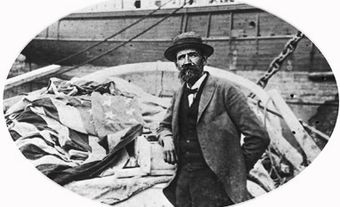France Daigle, Acadian author (born 18 November 1953 in Dieppe, a suburb of Moncton, New Brunswick), is the leading representative of postmodern Acadian literature. Her work has sparked a great deal of interest in Québec, English Canada, and other parts of the Francophonie. She is mainly a novelist but has also written a number of postmodern plays for the theatre company Moncton Sable, including Sable (1997), Craie (1999), Foin (2000), Bric-à-brac (2001), En pelletant de la neige (2004), Sans jamais parler du vent (2004), and Histoire de la maison qui brûle (2007). However, these plays have never been published.
Education and Early Novels
France Daigle graduated from the University of Moncton in 1976 with a BA in arts and worked as a journalist for the daily newspaper L’Évangéline from 1973 to 1977. Her early novels were quite short and used an abundance of blank space to convey muteness and silence. Raoul Boudreau, professor of French literature at the University of Moncton, thought that they conveyed a characteristic of the Acadian psyche: understatement (also called litotes, or the art of saying less to imply more) and, more broadly, an economic use of words. The novels Sans jamais parler du vent (1983), Film d’amour et de dépendance (1984), Variations en B et K (1985), Histoire de la maison qui brûle (1985), and La beauté de l’affaire (1991) are all quite short and embody the main tenets of postmodernism: deconstruction of the narrative, self-reflection, frequent references to the story itself by the narrator, and the creation of distance from the real world. All these elements draw the reader’s attention to the writing and creative process itself as art in action. There are also fleeting, often implicit, references to Acadia.
Starting with 1953. Chronique d’une naissance annoncée (1995), a studied prolixity emerges in Daigle’s work, and representations of Acadia become an important motif. The author was born in 1953, and she writes herself into the story as Bébé M, daughter of the editor-in-chief of L’Évangéline, which is published in Moncton. The narrative is still quite fragmented, however, especially because of the extensive use of intertextuality, or the incorporation of existing texts into the work. Excerpts from articles in L’Évangéline are actually woven into the narrative, with the result that national and international historical events from 1953 as well as local anecdotes, sometimes quite insignificant in nature, fill the pages of the postmodern novel — the author’s main goal is, after all, to “produce text.” Besides intertextuality, one of the main characteristics of “Daiglesque” writing (and postmodernism) is the proliferation of a given story. From one novel to the next, Daigle continues the story of Elizabeth and Claude, two characters from La vraie vie (1991).
Pas pire and the Use of Chiac
Pas pire (1998) is the most successful of all Daigle’s works. It exhibits not only the postmodern novel characteristics mentioned above but also more intense self-reflection, made evident through the literary technique of mise en abyme, or a story within a story: the story is about an author, France Daigle, who is writing a novel called Pas pire, as well as the various characters in this novel. The main character suffers from agoraphobia and must overcome her fear of travelling to receive literary acclaim and appear on Bernard Pivot’s French television program Bouillon de culture to talk about her new book. This book introduces two new characters who will become integral parts of the author’s imaginary universe: Terry Després and Carmen Thibodeau, young people from the Moncton area who meet and begin a romantic relationship.
Daigle transcribes their dialogue in a regional dialect called Chiac. It is a variety of Acadian French, characterized by archaic vocabulary and pronunciation as well as terms and syntactic structures borrowed from English. In addition, humour plays a significant role in Daigle’s writing and comes across very strongly in her use of Chiac. Again, the author makes use of intertextuality and proliferation of the story to at once enrich and fragment the text. For example, when Carmen receives a book about deltas from her aunt, the author inserts a number of passages resembling encyclopedia entries. Similarly, since Terry practices Yi King (a form of Chinese divination related to astrology), the narrative is interspersed with passages describing the 12 signs of the zodiac. Finally, a third narrative joins the other two: the story of Elizabeth, a French oncologist practising in Moncton, who goes to Europe and has a short-lived relationship with Hans.
Recent Work
Terry and Carmen’s life story is taken up again in Un fin passage (2001). At the end of the preceding novel, Carmen had revealed her pregnancy to her partner and they were planning to take a trip to France or Louisiana. We rejoin them on a plane headed for Paris, where a culture shock awaits them.
Petites difficultés d’existence (2002), in contrast, illustrates the artistic and cultural life of Moncton. It reflects the real world to some degree, but it mostly springs from the author’s imagination. The main narrative follows Zed, a friend of Terry and Carmen, and his plan to convert an abandoned building into a cultural centre and lofts for artists.
In 2012, France Daigle won the Governor General’s Literary Award for her masterpiece entitled Pour sûr (2011). As a work of fiction, the novel is a continuation of her three previous novels. It features a number of familiar faces, including Terry and Carmen, who are living in one of the renovated lofts thanks to Zed’s efforts at the end of Petites difficultés d’existence. Fragmentation is again a significant characteristic of the work, as is the encyclopedic thrust of some of the earlier novels. This time, however, there is an index at the end of the book to help the reader find various characters and search for information on a multitude of subjects. Again, a number of characters converse in Chiac.
One of France Daigle’s novels has been adapted for the big screen. Jean-Marc Larivière’s Effractions was released in November 2014 as a film adaptation of La vraie vie (1991). At the same time, the translation of Pour sûr (For Sure) was up for the IMPAC Dublin award, one of the most prestigious international literary prizes.
Contribution to the Development of Acadian Culture
France Daigle’s novels remain eminently postmodern despite a return to narrative and referential reality (Acadia and the modern world) since 1953. Her stories, often reflecting the literary processes of proliferation and intertextuality, continue to be intensely self-referential in that the text constantly refers to itself. At the same time, they continue to give contemporary Acadian culture and language (or at least an Acadian dialect) exposure in Québec and other parts of the Francophonie.
Publications
Sans jamais parler du vent. Roman de crainte et d'espoir que la mort arrive à temps (1983)
Film d'amour et de dépendance. Chef-d’œuvre obscur (1984)
Histoire de la maison qui brûle. Vaguement suivi d'un dernier regard sur la maison qui brûle (1985)
Variations en B et K. Plans, devis et contrat pour l'infrastructure d'un pont (1985)
In collaboration with Hélène Harbec, L'été avant la mort (1986)
La beauté de l'affaire. Fiction autobiographique à plusieurs voix sur son rapport tortueux au langage (1991)
La vraie vie (1991)
1953. Chronique d’une naissance annoncée (1995)
Pas pire (1998)
Un fin passage (2001)
Petites difficultés d’existence (2002)
Pour sûr (2011)
Honours and Awards
Prix Pascal-Poirier for excellence in French literature (1991)
Prix Éloizes, literary artist of the year, for the novel Pas pire (1998 and 2002)
Prix France-Acadie for the novel Pas pire (1998)
Prix Antonine-Maillet-Acadie Vie for the novels Pas pire (1999) and Pour sûr (2012)
New Brunswick Lieutenant-Governor’s Award for High Achievement in French-Language Literary Arts, for the entire body of her work (2011)
Governor General’s Literary Award for the novel Pour sûr (2012)
Prix Champlain for the novel Pour sûr (2012)
Prix Éloizes, literary artist of the year, for the novel Pour sûr (2014)

 Share on Facebook
Share on Facebook Share on X
Share on X Share by Email
Share by Email Share on Google Classroom
Share on Google Classroom


